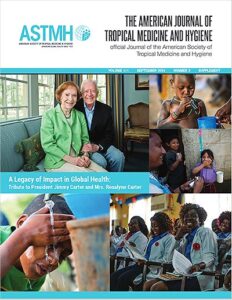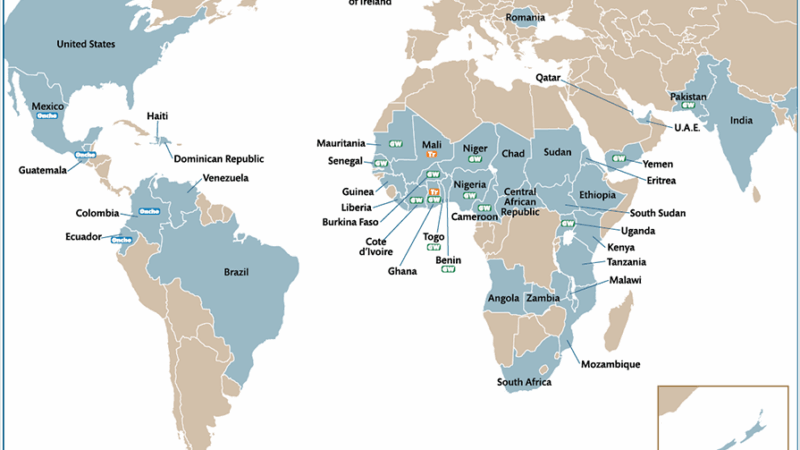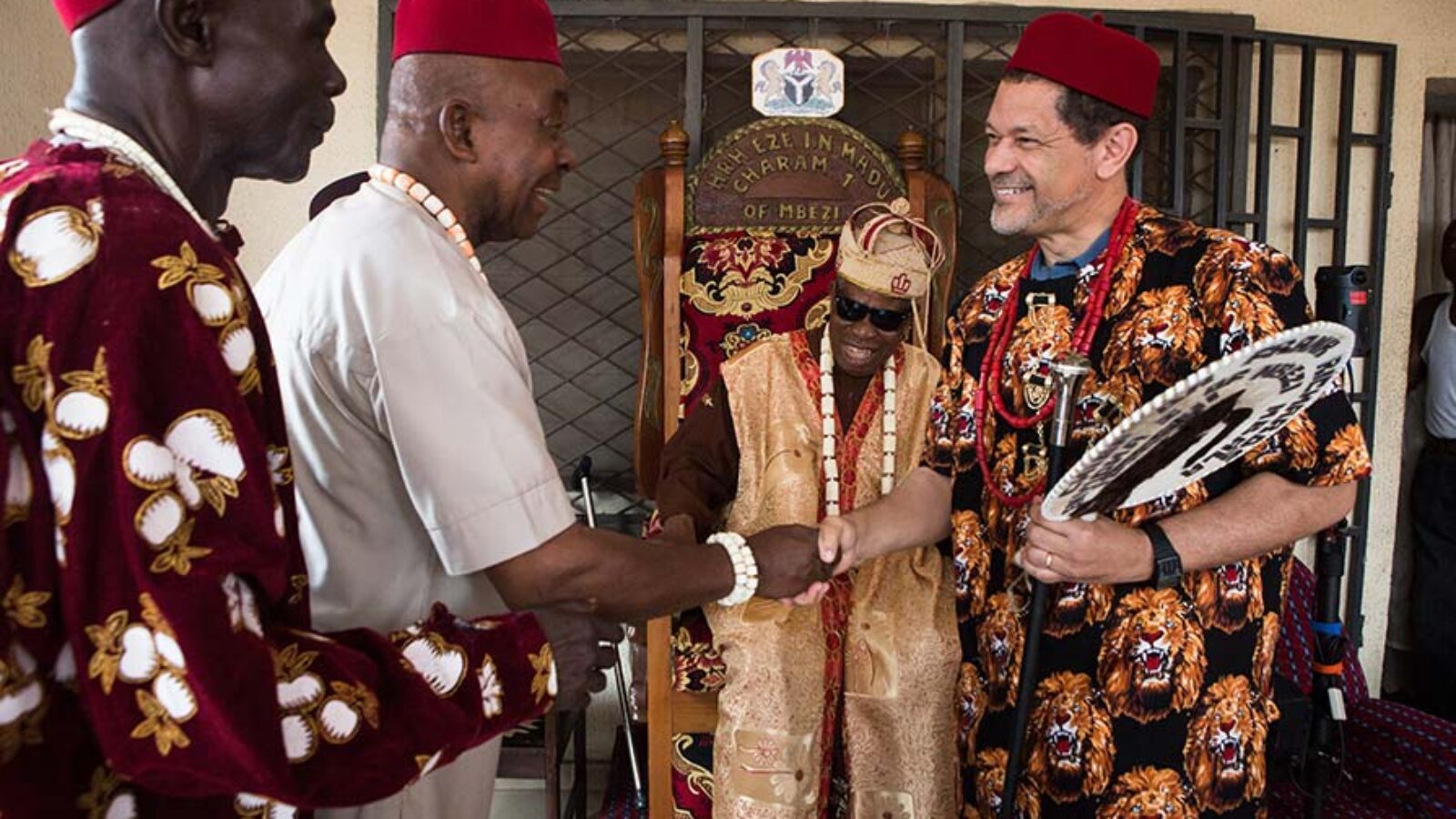Leading Journal Honors Carters’ Public Health Legacy

The foremost journal of tropical medicine in the United States has published a supplement honoring the public health legacy of former President Jimmy Carter and the late First Lady Rosalynn Carter. In a demonstration of technical expertise and the respect The Carter Center carries in that field, the supplement features 16 articles authored or co-authored by Carter Center experts
The peer-reviewed articles have been posted ahead of print online on the American Journal of Tropical Medicine and Hygiene website throughout 2024 and are being published together in a single supplement to highlight the material’s richness, depth, and diversity of impact, said Dr. Kashef Ijaz, vice president of health programs at The Carter Center.
“We at The Carter Center are extraordinarily pleased to be featured in such a meaningful way by the American Society of Tropical Medicine and Hygiene,” Ijaz said. “President and Mrs. Carter were pioneers and exemplars in global health as well as many other important fields, and it is a privilege to follow in their footsteps. We thank the society for this recognition and collaboration.”
The AJTMH, established in 1921, is among the top-ranked tropical medicine journals in the world, publishing original scientific articles and the latest findings. Two or more supplements on topics of special interest are published annually. The Carter Center supplement, which will be published Sept. 4, is unusual in that it focuses on a contributor rather than a topic.
The supplement’s guest editor was Mark L. Eberhard, a well-known global health researcher and practitioner who recently retired from the U.S. Centers for Disease Control and Prevention. In an editorial, Eberhard recognizes the Carters’ “longstanding and tireless contributions to public health.
“The Carters did not just talk the talk, they walked the walk,” Eberhard writes. “For decades, they made repeated trips to affected countries, stopping not only in the capital cities to meet and engage state leaders, but traveling (often with those same leaders) to remote affected communities where they were able to see firsthand the difficulties and accomplishments of various programs.”
Topics in the supplement cover a wide range of current Carter Center health programming — Guinea worm disease, mental health, river blindness, trachoma, lymphatic filariasis, schistosomiasis, and the Hispaniola Initiative to eliminate malaria and lymphatic filariasis from Haiti and the Dominican Republic.
The articles describe important programmatic interventions, research, and clinical studies conducted by Carter Center experts, partners, ministries of health, and national programs in the course of helping to end or avert suffering for millions of people on multiple continents. Here are a few examples:
- An analysis of factors influencing community engagement as Guinea worm and polio near elimination in Chad
- A look at how the blood responds to signs of trachoma infection
- A study of whether people in certain parts of Uganda believe that river blindness was eliminated where they live
- A national survey of knowledge and attitudes toward mental disorders in Liberia
- Results of surveys testing for transmission of lymphatic filariasis and malaria in Haiti
- These articles shed light on key issues in tropical medicine, furthering the scientific community’s understanding and contributing significantly to research. The peer review process ensures that the research methods are sound and the conclusions are valid.
The Carter Center’s Dr. Frank Richards coordinated the execution of the supplement as one of his final acts before retiring this summer. Richards spent 25 years at the Center, most of them as director of its River Blindness Elimination Program, Lymphatic Filariasis Elimination Program, Schistosomiasis Control Program, and Malaria Control Program. Considered a leading global researcher of those diseases, he is a longtime member of the ASTMH and has had numerous articles published in the AJTMH and other journals.
Here are links to each article in the AJTMH supplement:
- Slaying the Serpent: A Research Agenda to Expand Intervention Development and Accelerate Guinea Worm Eradication Efforts
- Factors Influencing Community Engagement during Guinea Worm and Polio Eradication Endgames in Chad: Recommendations for “Last Mile” Programming
- Predicting the Environmental Suitability and Identifying Climate and Sociodemographic Correlates of Guinea Worm (Dracunculus Medinensis) in Chad
- Over 25 Years of Hope: Development of Lymphatic Filariasis Patient Support Groups in Haiti
- Results of Integrated Transmission Assessment Surveys for Lymphatic Filariasis and Malaria in Haiti, 2017–2022
- A Mixed Methods Evaluation of Mainstreaming Mass Drug Administration for Schistosomiasis and Soil-transmitted Helminths in Four Districts of Nigeria
- Do Residents in Three Onchocerciasis Foci of Uganda Believe that Onchocerciasis Was Eliminated? A Knowledge, Attitude, and Practices Survey Conducted within Three Years After Stopping Ivermectin MDA
- Integrated Serosurveillance for Onchocerciasis, Lymphatic Filariasis, and Schistosomiasis in North Darfur, Sudan
- Scorecard Approach to Eliminate Onchocerciasis in Venezuela
- Progress Toward Onchocerciasis Elimination in Brazil
- The Epidemiology of Ocular Chlamydia Trachomatis Infection within Districts Persistently Endemic for Trachoma in Amhara, Ethiopia
- Serological Responses to Trachoma Antigens Prior to the Start of Mass Drug Administration: Results from Population-based Baseline Surveys, North Darfur State, Sudan
- Severity of Trachomatous Scarring among Adults in Trachoma-Endemic Amhara Region of Ethiopia
- Impact of a School Trachoma Program Emphasizing Facial Cleanliness and Environmental Improvement in Amhara, Ethiopia
- Evaluation of the International Task Force for Disease Eradication: A Review of Past Successes and Future Direction
As of this writing, the following article had been accepted for publication in the supplement but not yet posted on the journal’s website:
- A National Survey of Knowledge, Attitudes, and Practice Towards Mental, Neurological, and Substance Use Disorders in Liberia
Global Impact Starts with You
Your support sustains the Carter Center's mission of waging peace, fighting disease, and building hope around the world.


